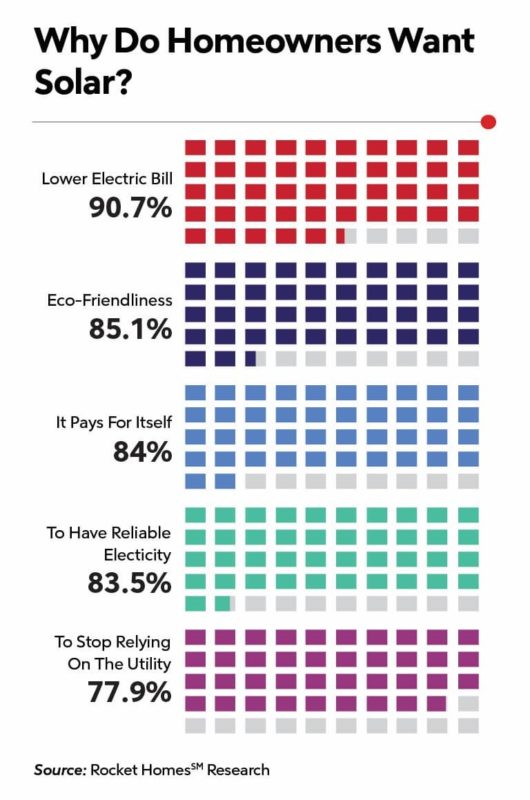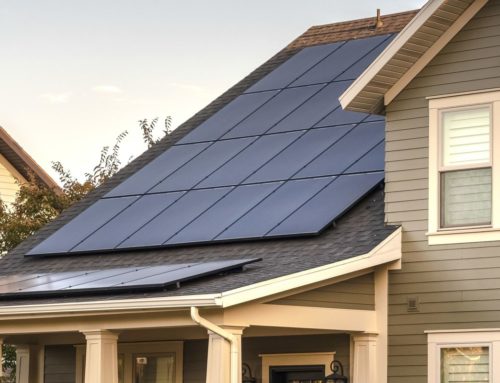Survey said a majority of homeowners want to go solar, but up-front costs are a deterrent

March 11, 2022
A survey by Rocket Homes has confirmed (again) that interest in home solar remains high and that how much solar costs is the top question for homeowners interested in solar, and for good reason. With a price tag of $15,000 to $30,000 or more, there’s a good chance that solar is the single biggest investment you make in your home. Figuring out how to pay for home solar is a task in itself. While many solar salespeople and lead generation companies are out there peddling “Free Solar”, deep down we all know that nothing is free. Read more about “free” solar panels and other options for financing a home solar purchase here.
Home solar is a significant financial commitment and investment that you’re relying on to generate energy and savings for 25 or more years, so it’s critical that homeowners are making good decisions on their home solar design, equipment and contractor. Yet home solar is complicated from nearly every angle: Design, technology, price, rebates & incentives, state and utility policies and more. Learn how Sentinel was built to help homeowners simplify their evaluation of home solar and empower them to make better decisions on home solar and clean energy here.
Here’s a link to the original article with details on homeowner interest in solar and motivations for going solar.
A recent survey conducted by Rocket Homes, a national platform for homebuyers, found that 66.5% of those who don’t have solar on their homes are interested in getting it in the future.
To understand homeowner interest in and experience with residential solar power, Rocket Homes surveyed 2,096 homeowners across the US. Nearly 30% of respondents say they already have solar panels or solar shingles or are in the process of getting them.
Those who purchased their homes recently are far more likely to have solar: Only 9.7% of those who purchased prior to 2000 have solar, versus 35.3% of those who purchase in the past two years.
Reasons given for wanting to go solar include lowering their electric bill, being eco-friendly, cost payback, the reliability of the electricity, and to reduce or eliminate reliance on the local utility. While payback for system owners varies widely, according to Rocket Homes data, homes with solar are nearly 25% more likely to sell for more than the asking price and spend 13.3% less time on the market.
While 90.7% of respondents said their reason to go solar was to lower their electric bills, it didn’t seem to matter whether the respondents had high electric bills or not. 53.2% of those paying $60 or less a month for electricity showed interest in going solar, and 69.2% who pay more than 200 are interested in putting solar on their homes.
What’s keeping many from going solar? Nearly 75% said it’s the upfront costs, and another 43.8% said the costs of solar outweighs the benefits. Additionally, over 40% said they’d need to upgrade their roof before a solar installation, so that added cost was also a deterrent.
Around half the respondents indicated that financial assistance, tax incentives, grants, or good financing options would motivate them to go solar. While incentives do exist on the federal level and in some states and local jurisdictions, it seems that educating homeowners on existing solar assistance and potential financing options could help homeowners overcome the financial barrier.
A recent SEIA/Wood Mackenzie report estimates that passage of some form of the Build Back Better Act with a long-term investment tax credit could boost US residential solar installations by 20%. Uncertainty around net metering policies is also stalling residential solar. In California in particular, Wood Mackenzie forecasts that the passage of NEM 3.0 could cut residential solar installations by half.
Survey said a majority of homeowners want to go solar, but up-front costs are a deterrent

March 11, 2022
A survey by Rocket Homes has confirmed (again) that interest in home solar remains high and that how much solar costs is the top question for homeowners interested in solar, and for good reason. With a price tag of $15,000 to $30,000 or more, there’s a good chance that solar is the single biggest investment you make in your home. Figuring out how to pay for home solar is a task in itself. While many solar salespeople and lead generation companies are out there peddling “Free Solar”, deep down we all know that nothing is free. Read more about “free” solar panels and other options for financing a home solar purchase here.
Home solar is a significant financial commitment and investment that you’re relying on to generate energy and savings for 25 or more years, so it’s critical that homeowners are making good decisions on their home solar design, equipment and contractor. Yet home solar is complicated from nearly every angle: Design, technology, price, rebates & incentives, state and utility policies and more. Learn how Sentinel was built to help homeowners simplify their evaluation of home solar and empower them to make better decisions on home solar and clean energy here.
Here’s a link to the original article with details on homeowner interest in solar and motivations for going solar.
A recent survey conducted by Rocket Homes, a national platform for homebuyers, found that 66.5% of those who don’t have solar on their homes are interested in getting it in the future.
To understand homeowner interest in and experience with residential solar power, Rocket Homes surveyed 2,096 homeowners across the US. Nearly 30% of respondents say they already have solar panels or solar shingles or are in the process of getting them.
Those who purchased their homes recently are far more likely to have solar: Only 9.7% of those who purchased prior to 2000 have solar, versus 35.3% of those who purchase in the past two years.
Reasons given for wanting to go solar include lowering their electric bill, being eco-friendly, cost payback, the reliability of the electricity, and to reduce or eliminate reliance on the local utility. While payback for system owners varies widely, according to Rocket Homes data, homes with solar are nearly 25% more likely to sell for more than the asking price and spend 13.3% less time on the market.
While 90.7% of respondents said their reason to go solar was to lower their electric bills, it didn’t seem to matter whether the respondents had high electric bills or not. 53.2% of those paying $60 or less a month for electricity showed interest in going solar, and 69.2% who pay more than 200 are interested in putting solar on their homes.
What’s keeping many from going solar? Nearly 75% said it’s the upfront costs, and another 43.8% said the costs of solar outweighs the benefits. Additionally, over 40% said they’d need to upgrade their roof before a solar installation, so that added cost was also a deterrent.
Around half the respondents indicated that financial assistance, tax incentives, grants, or good financing options would motivate them to go solar. While incentives do exist on the federal level and in some states and local jurisdictions, it seems that educating homeowners on existing solar assistance and potential financing options could help homeowners overcome the financial barrier.
A recent SEIA/Wood Mackenzie report estimates that passage of some form of the Build Back Better Act with a long-term investment tax credit could boost US residential solar installations by 20%. Uncertainty around net metering policies is also stalling residential solar. In California in particular, Wood Mackenzie forecasts that the passage of NEM 3.0 could cut residential solar installations by half.
Have a question about how Sentinel empowers homeowners to get better home solar and clean energy? Send us a message and we’ll answer ASAP.
Have a question about how Sentinel empowers homeowners to get better home solar and clean energy? Send us a message and we’ll answer ASAP.








